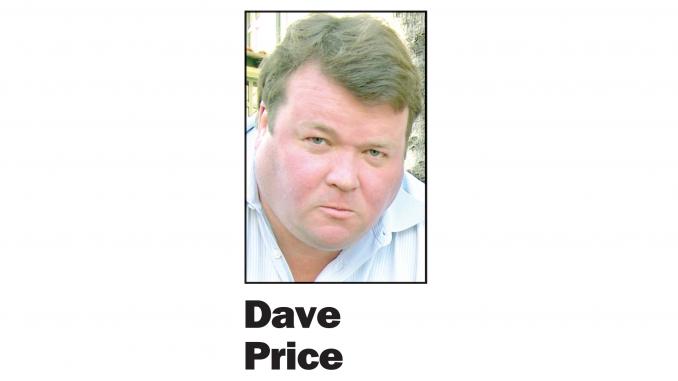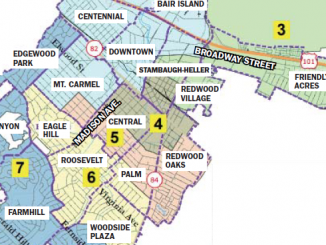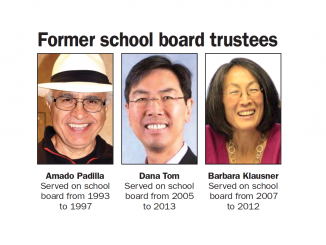
OPINION
BY DAVE PRICE
Daily Post Editor
Imagine if you could cloak your identity and anonymously change the policy of a local government?
Far fetched? Not in California, where it is perfectly legal — and local governments won’t even ask you for your name.
In the mid-Peninsula, we’ve seen a number of lawsuits that seek to change local policies.
In one case, an anonymous person is seeking to change the entire structure of a city government and will probably succeed.
That person has retained a Malibu attorney, Kevin Shenkman, who is threatening to sue Menlo Park if it doesn’t dump its system of at-large elections, where all residents get to vote for all five council members, and replace it with a district system, in which every person gets to vote for only one member of council.
Even though this reduces the voting rights of residents by 80%, council is moving forward because of this threat. This fall, Menlo Park will have district elections.
We don’t know who Shenkman is representing. The stated reason for the threatened lawsuit is that Menlo Park is racially “polarized” because the Latino community on the east side hasn’t had somebody from their neighborhood on council in several years.
We don’t even know if the person behind this suit is actually a Latino who allegedly has been injured by district elections or just somebody with an ulterior motive.
This person ought to be defending this idea in the court of public opinion, but he or she doesn’t have the guts.
Marijuana policy
The same thing is happening in San Mateo County. In January, a group named “SMC Marijuana Moratorium Coalition” filed a lawsuit against the county trying to stop the farming of marijuana, even though California voters in 2016 legalized the drug.
The members of this “coalition” are unknown. Is it the alcohol industry trying to thwart a potential rival?
The coalition’s lawyer, Jason Flanders, says his clients don’t represent any “outside interests” and simply want a meaningful review of environmental laws before farming begins.
I’d be less suspicious of the lawsuit if we knew who was behind it.
Little League targeted
Palo Alto was also hit with an anonymous lawsuit in 2015. A group called “Parents and Neighbors Against Little League Cell-tower” sued the city to stop the league from putting up a cellphone tower in the outfield of their park at 3672 Middlefield Road.
The Little League wanted to use the rent it got from Verizon to subsidize player fees, so kids could participate regardless of their family’s income.
My guess is that these secret plaintiffs wanted to avoid the backlash they’d get from depriving the Little League of this money.
The anonymous plaintiffs argued that a cell tower would not fit in with the neighborhood. The city won the lawsuit, with a judge saying that the tower would improve cellphone coverage in the area with no impact on the neighbors.
Environmental concerns?
Want another example? In 2009, a mysterious group called “Concerned Citizens of Menlo Park” sued to stop a developer of the former Cadillac dealership on El Camino from opening a grocery store.
The suit complained about the environmental impact of the project. No members of the group were named.
The city settled the suit with a curious agreement. The size of the building on the site could remain the same as the developer had proposed, but if a grocery store were to go in, it could only be 51,000 to 32,000 square feet — smaller than Safeway and Draeger’s in Menlo Park. The settlement also banned self-checkout lines in any grocery.
What does self-checkout lines have to do with the environment?
Then a name of one of the “Concerned Citizens of Menlo Park” emerged. He wasn’t even a Menlo Park resident. It was Tony Alexander, an officer of the United Food and Commercial Workers Union, Local 5, in San Jose. The union represents employees of Safeway and Draeger’s, stores that would face competition from a nonunion Whole Foods.
Some environmental suit!
I think there ought to be a law that requires the disclosure of the names of people who bring lawsuits against local governments. The only exception would be for a sex assault victim. But when you’re trying to change policy, you shouldn’t be allowed to do it anonymously.
In our system of government, we expect people will make their case publicly, not with a bag over their head.
• • •
Digital DNA sculpture
While I’m on the topic of lawsuits, did you see our story Tuesday about how the artist who created the DNA Digital egg in Lytton Plaza is threatening to sue the city of Palo Alto if it removes her sculpture? If she sues, I know what the city should argue in court — the statue of limitations.
Editor Dave Price’s column appears on Mondays. His email address is [email protected].



